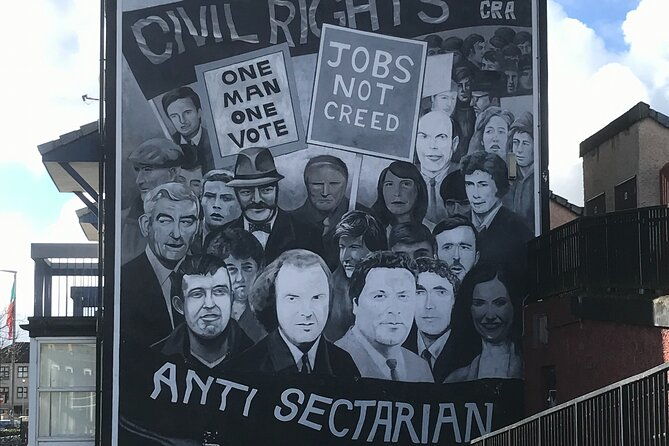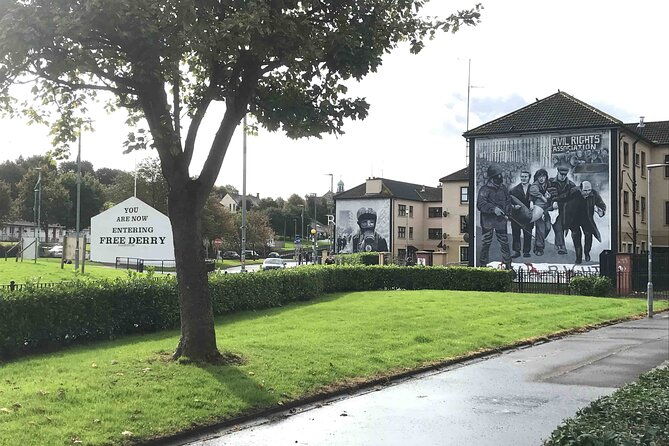The Bogside, a historically significant neighborhood in Derry-Londonderry, Northern Ireland, has witnessed some of the most profound events during the Troubles. A private political tour provides an intimate exploration of this area, guiding visitors through the powerful murals and addressing the impact of the Civil Rights Movement, the Bloody Sunday Massacre, and the ongoing peace process. Knowledgeable local guides offer unique perspectives, shedding light on the community’s journey towards reconciliation and the role of republicanism in the region’s turbulent past.
- Key Points
- Overview of the Bogside
- The Battle of the Bogside
- The Bloody Sunday Massacre
- The Civil Rights Movement in Derry
- The Murals of the Bogside
- The Role of Republicanism in the Troubles
- The Impact of the Peace Process
- Practical Information for the Tour
- The Sum Up
- More Private Tours in Londonderry
- More Tours in Londonderry
- More Tour Reviews in Londonderry
- Still browsing? Here are more Londonderry experiences we've covered recently
Key Points

- Guided tours of the Bogside neighborhood in Derry-Londonderry, offering insights into its complex political and social history during the Troubles.
- Exploration of the area’s renowned murals, which serve as visual chronicles of civil rights movements and resistance.
- Visits to significant sites like Free Derry Corner, the scene of the Bloody Sunday massacre, to understand their historical importance.
- Discussions on the impact of the peace process and the gradual improvement in community relations in Northern Ireland.
- Opportunities to engage with local guides and community members, providing a deeper understanding of the region’s ongoing reconciliation efforts.
Overview of the Bogside

The Bogside is a historically significant neighborhood located in Derry-Londonderry, Northern Ireland. It has played a central role in the region’s complex political and social history.
The area is known for its murals depicting the events of the Troubles, a period of conflict between nationalists and unionists. Visitors can explore the neighborhood’s rich cultural heritage and gain insights into the complex dynamics that have shaped Northern Ireland’s past and present.
The Bogside remains an important site for understanding the region’s complex history and the ongoing efforts to promote peace and reconciliation.
Prefer keeping things personal? Here are more private experiences we've reviewed in Londonderry
The Battle of the Bogside
Amidst the rich cultural heritage and complex history of the Bogside, a pivotal event known as the Battle of the Bogside unfolded in August 1969.
Tensions between the local Catholic community and the Royal Ulster Constabulary (RUC) police force erupted into three days of intense clashes.
Barricades were erected, petrol bombs were thrown, and the RUC responded with tear gas and water cannons.
Tensions boiled over as barricades were erected, petrol bombs thrown, and the RUC retaliated with tear gas and water cannons.
The battle highlighted the deep-seated divisions in Northern Ireland and the growing civil rights movement.
It became a defining moment in the Troubles, shaping the political landscape and the ongoing struggle for justice and equality in the Bogside.
The Bloody Sunday Massacre
Though the Battle of the Bogside had highlighted the growing tensions in the region, the events of Bloody Sunday would go on to become one of the most infamous and tragic chapters in the history of the Troubles.
On January 30, 1972, a peaceful civil rights march in Derry turned deadly when British paratroopers opened fire on the unarmed protesters, killing 13 and injuring 14 others.
The massacre sparked outrage and fueled further conflict, becoming a pivotal moment that galvanized support for the republican cause.
The events of Bloody Sunday left a lasting impact, underscoring the deep divisions and violence that defined the Troubles.
The Civil Rights Movement in Derry
As the tensions in Northern Ireland continued to escalate, the people of Derry became increasingly determined to seek change through peaceful civil rights activism.
In the late 1960s, the Northern Ireland Civil Rights Association (NICRA) organized marches and protests in Derry, demanding equal rights for Catholics.
The infamous "Battle of the Bogside" in 1969 saw three days of intense clashes between residents and the Royal Ulster Constabulary, a pivotal moment in the growing unrest.
The Battle of the Bogside in 1969 was a pivotal moment of intense clashes between residents and the Royal Ulster Constabulary.
These events laid the groundwork for the later Bloody Sunday massacre and catalyzed the Troubles, a period of violent conflict in Northern Ireland.
The Murals of the Bogside
The Bogside, a working-class Catholic neighborhood in Derry-Londonderry, is renowned for its powerful and evocative murals.
These murals serve as visual chronicles of the Troubles, depicting scenes of civil rights marches, British Army violence, and republican resistance. The murals are a medium for political expression, commemorating historic events and honoring those who lost their lives.
They’ve become iconic symbols of the Bogside’s defiance and resilience.
Key murals include:
-
The People’s Gallery
-
The Death of Innocence
-
Free Derry Corner
-
The Bloody Sunday Mural
-
The Petrol Bomber
- Derry/Londonderry-Street Art and Murals Walking Tours
- Derry City: the Troubles Bogside Walking Tour
- Derry City: The Bloody Sunday Story – Walking Tour
- Derry/Londonderry – City Walls History Walking Tour Experiences
- Peacemakers Museum Entry Ticket
- Derrie Danders: Highlights of the Walled City a Self-Guided Audio Tour
The Role of Republicanism in the Troubles
Republicanism played a pivotal role in the Troubles, a conflict that rocked Northern Ireland for decades.
Republican groups like the Provisional IRA sought to end British rule and unite Northern Ireland with the Republic of Ireland. They launched a campaign of violence, including bombings and shootings, targeting security forces and civilians.
This militant republicanism faced off against unionist groups seeking to maintain Northern Ireland’s status as part of the United Kingdom.
The conflict fueled decades of political and sectarian tensions, with both sides unwilling to compromise on the core issue of Northern Ireland’s future.
The Impact of the Peace Process
The Peace Process ushered in a transformative era for Northern Ireland, as the parties involved sought to move beyond the divisive conflict that had plagued the region for decades.
The impact of the Peace Process included:
Establishment of the Good Friday Agreement, decommissioning of paramilitary weapons, increased cooperation between governments, greater representation, and gradual improvement in community relations.
-
Establishment of the Good Friday Agreement, a landmark power-sharing deal
-
Decommissioning of paramilitary weapons and the dismantling of security infrastructure
-
Increased cooperation between the British and Irish governments
-
Greater representation of diverse political perspectives in the Northern Ireland Assembly
-
Gradual improvement in community relations and a reduction in sectarian violence
These changes laid the foundation for a more stable and peaceful future in Northern Ireland.
Practical Information for the Tour
The meeting point for the Private Political Tour of the Bogside is at the entrance to the Guildhall, located at 2-4 Shipquay Pl, Londonderry BT48 6DH, UK.
The tour runs daily from 9:00 AM to 8:30 PM between May 1, 2024, and August 11, 2025.
It’s a wheelchair-accessible, stroller-friendly walking tour that allows service animals and is near public transportation.
Priced from $32.17 per person, the private tour ensures only your group participates.
Cancellations up to 24 hours before the start time are free, and a "Reserve Now, Pay Later" option is available.
Past participants have given the tour a 5-star rating based on 3 reviews.
The Sum Up
The Bogside tour offers a profound and emotional exploration of a pivotal chapter in Northern Ireland’s history. Visitors gain a deeper understanding of the Troubles and the community’s ongoing journey towards peace and reconciliation. The powerful murals serve as poignant reminders of the resilience and determination of the Bogside residents, who continue to shape the narrative of this historically significant neighborhood.
More Private Tours in Londonderry
- Derry City Private Walking Tour
- Heritage and Stories: A Comprehensive Derry Private Walking Tour
- Journey Into Derry’S Past: a Private Walking Tour
- Londonderry Private Walking Tour With A Professional Guide
- Full-Day Private Tour From Game of Thrones Odyssey
- Bloody Sunday Remembered: Private Walking Tour of Derry
More Tours in Londonderry
- Derry City Private Walking Tour
- Heritage and Stories: A Comprehensive Derry Private Walking Tour
- Journey Into Derry’S Past: a Private Walking Tour
- Derrie Danders: A Self-Guided Audio Tour of the Quayside and North City
- Londonderry Private Walking Tour With A Professional Guide
- Full-Day Private Tour From Game of Thrones Odyssey
More Tour Reviews in Londonderry
- Derry City Private Walking Tour
- Heritage and Stories: A Comprehensive Derry Private Walking Tour
- Journey Into Derry’S Past: a Private Walking Tour
- Derrie Danders: A Self-Guided Audio Tour of the Quayside and North City
- Londonderry Private Walking Tour With A Professional Guide
- Full-Day Private Tour From Game of Thrones Odyssey
Still browsing? Here are more Londonderry experiences we've covered recently
- Derry City Private Walking Tour
- Heritage and Stories: A Comprehensive Derry Private Walking Tour
- Journey Into Derry’S Past: a Private Walking Tour
- Derrie Danders: A Self-Guided Audio Tour of the Quayside and North City
- Londonderry Private Walking Tour With A Professional Guide
- Bloody Sunday Remembered: Private Walking Tour of Derry
- Derrie Danders: Wander Around the Waterside on a Self-Guided GPS Audio Tour
- Derrie Danders: Unveiling Derrys Dark & Haunted Past Audio Tour
- Derry/Londonderry – Cityside Darker History Walking Tours
- Private Political Tour of the Bogside
